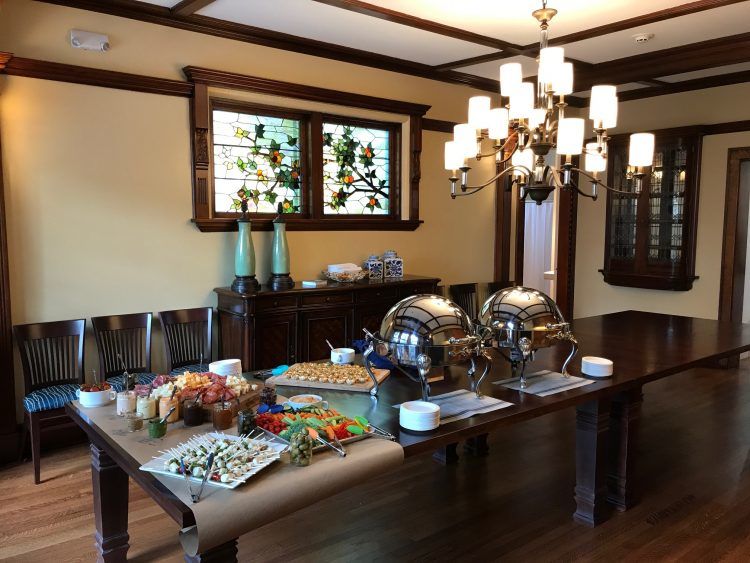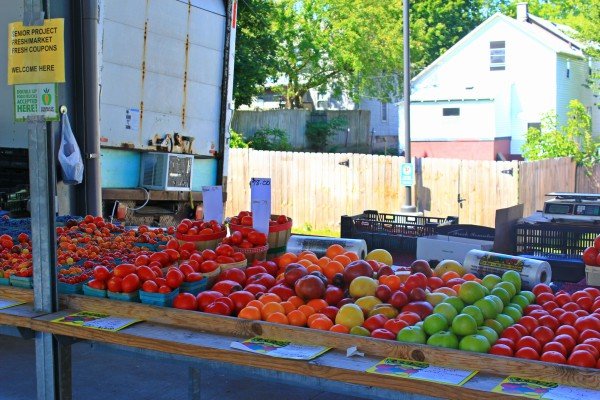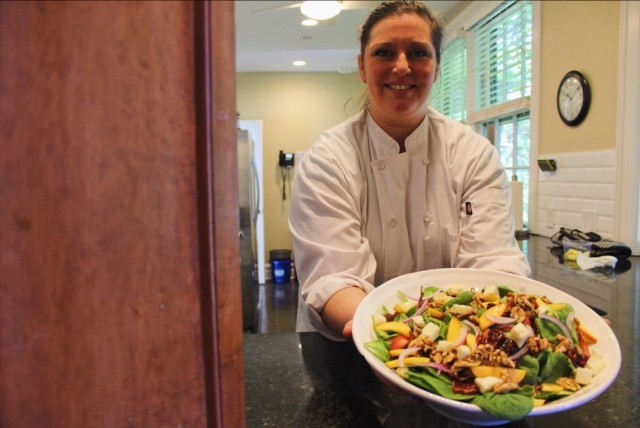Healthy Nutrition Can Help Me Stay Sober? DO Tell…

The dining room – Sanford House at John Street
In the musical Oliver, there is a scene where a long line of adorable, strategically smudged orphans imagine they are eating a feast instead of the gruel they are being served. They warble, “Food, glorious food – we’re anxious to try it! 3 banquets a day. Our favourite diet. Just picture a great big steak fried, roasted or stewed. Oh food, marvelous food, wonderful food, magical food, fabulous food, beautiful food! Glorious food!”
Sometimes, that is how it feels to be new to recovery. Not the lineup of soprano orphans or the besmirched faces, but the impulse to eat real food. Oftentimes, active addiction will rob a person of the desire to cook or consume healthy food. And the “munchies” always involve greasy, sugary or processed fare designed to boost dopamine levels. At the tail end of my alcohol dependence I survived on pretzels, Diet Coke and white wine. A lot of white wine. And although it wasn’t gruel (in case you have always wondered, gruel is a thin, cereal soup), I got the lion’s share of my calories and “nourishment” from chardonnay.
Most of our clients come to us depleted. Alcohol and other drugs cause a host of problems in the body, not the least of which is nutrition. Alcohol impedes nutritional breakdown, stimulants suppress the appetite altogether and opiates cause stomach issues – especially during withdrawal. Some drugs cause you to eat too much, others too little. A person who is suffering with addiction is unlikely to eat healthily or prepare a well balanced meal.
When I got sober, I told myself, “Self, if you don’t drink, you can eat anything you want.” Just like Oliver, I dreamed of sugar laced treats. Not surprising, because my body was used to the blood sugar ups and downs from alcohol. Six months later I was still sober, but twenty-five pounds overweight and battling a full-on sugar addiction. I hate when that happens.
No compromising with yourself in early recovery…
That kind of compromise with one’s self is typical in early recovery. Especially because the dormant appetite has returned. Why not treat myself to a little, harmless junk food when I am accomplishing something as momentous as sobriety? The problem with that line of thinking is that a “harmless treat” can turn into a transfer addiction. And nutritional education and nutritional therapy can increase the chances of success in recovery. So, why not “treat yourself” to a luxurious bath and cold grapes, and minimize the cakes and cookies…
Because good nutrition impacts the healing process.

An Excursion to the Fulton Street Farmers’ Market, Grand Rapids, Michigan
- Great, healthy food makes everyone (not just those in recovery) feel better
- And feeling better reduces the risk of relapse
- Nutrients give the body energy and strengthen the immune system
- Whole foods are one of the best ways to restore flagging health
- And control those cravings
- Changes in diet can positively alter the brain
- And good food is a reward and a first step toward learning to take better care of oneself
- For those with co-occurring eating disorders, relearning to eat intuitively and mindfully is key
- The ritual of eating with others reminds us of our (perhaps long forgotten) social wherewithal
- And cooking is a fun activity that can be taken away from treatment and brought into the home
- Cooking can inspire positive family time
- Enjoying shopping, and preparing dinner can also fill the triggering “it’s 5:00 somewhere” time of night
Learning from the Sanford House expert – Chef Leslie…

Fresh, whole foods (and that smile) can positively affect recovery…
Sanford House Chef Leslie says, “Good nutrition improves well-being. When I showcase my favorites or ask our clients what they want to eat, it makes them feel special. Something they might not have felt for a long time. Making healthy eating options sets the right tone for recovery and they are so appreciative! I also like to impart some suggestions for when our clients go home – meal prep for one or an interactive family recipe.”
When a client arrives at Sanford house, Leslie fills out an individual, nutritional guide for the duration of their stay. The guide includes any allergies or medical issues to be noted. Leslie also notes preferences, “spice threshold” and dislikes or sensitivities (she says some people can’t tolerate garlic…). This guide serves as a template for each client, and although the group usually eats the same food, Leslie accommodates gluten-free or vegan/vegetarian folks.

Where the magic happens – the gleaming kitchen – Sanford House at Cherry Street
Some of Leslie’s inspirations (designed to defuse the triggering times)…
- Brunch for lunch – making breakfast fun again
- Grow your own kitchen garden
- “Appy Hour” – Fabulous appetizers and mocktails
- 4:00 PM – 5:00 PM – Change the tradition – dinner earlier or later than usual, light a candle, incorporate children in the “fun”
- Recovery “Tailgating”
- Upping the Kitchen – A new apron, fancy kitchen utensils
- Lunch options to shake it up
- Bonding around the dinner table
- Flexible but pre-planned meals
- Gender neutral fare (“beefed up” for the guys)
- Leslie’s “Last Meal” – for those who are leaving treatment
The nutritional guidelines Leslie incorporates are important for those in recovery. She eliminates sugar as much as possible and includes whole grains in the diet. There are virtually no processed foods, and whole foods such as fresh fruits and vegetables are key. And lots of protein, because protein increases the production of amino acids – and natural dopamine. Meals, healthy snacks and proteins are distributed throughout the day.
Chef Leslie says, “In early recovery, food can be a form of therapy… Meals, flavors, and even familiar smells evoke good memories. My goal at Sanford House is to create new and lasting impressions for our residents as they begin a healthy life in recovery. I am excited to come to work every day.”
Food, Glorious Food…



